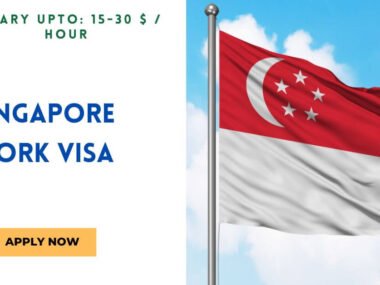Are you a professional, skilled worker, or entrepreneur dreaming of a career in Singapore? The city-state is a global hub for business and innovation, but landing a job is just the first step. You’ll need to secure the right work visa, known as a work pass in Singapore. Choosing the correct one can feel confusing, but this guide will help you understand the different Singapore work visa classes, their requirements, and the application process.
What Are the Main Singapore Work Visa Classes?
Singapore’s Ministry of Manpower (MOM) offers a variety of work passes designed for different types of foreign workers. The most common ones are:
- Employment Pass (EP): For foreign professionals, managers, and executives with a qualifying salary.
- S Pass: For mid-skilled technical staff.
- Personalised Employment Pass (PEP): A flexible pass for high-earning foreign professionals.
- EntrePass: For foreign entrepreneurs looking to start and run a new business in Singapore.
- Work Permit: For semi-skilled and unskilled foreign workers in specific sectors.
Each pass has its own set of rules and requirements, including minimum salary, educational background, and even the employer’s industry. It’s crucial to identify the right category for your situation before you begin the application process.
Deep Dive into Key Work Passes
Employment Pass (EP)
The Employment Pass is the most sought-after work visa for professionals. It’s for foreign managers, executives, and specialists who have a job offer from a Singaporean company. To qualify, you must meet specific criteria, with the most important being the salary requirement.
Since September 2023, new EP applicants must earn a minimum fixed monthly salary of S$5,000. This amount increases with age, with a higher salary required for older and more experienced candidates. For example, a candidate in their mid-40s may need to earn up to S5,500. These salary adjustments ensure a level playing field for local PMETs (Professionals, Managers, Executives, and Technicians).
In addition to salary, the EP application is now evaluated using the Complementarity Assessment Framework (COMPASS). This points-based system considers four core criteria:
- Salary: How your salary compares to local professionals.
- Qualifications: Your academic qualifications.
- Skills: Whether you possess skills in a shortage area.
- Diversity: The diversity of your company’s workforce.
You need to score a total of at least 40 points to get the pass. Your employer will also need to show they’ve fairly considered local candidates for the job before applying for an EP on your behalf.
S Pass
The S Pass is for mid-level skilled foreign workers. It’s an ideal option if you don’t meet the salary or education requirements for an EP. The minimum qualifying salary for the S Pass is S$3,000 per month, but this also goes up with age and experience.
Unlike the EP, the S Pass has a quota system. This means that a company can only hire a certain number of S Pass holders, which is a percentage of their total workforce. This quota, also known as the Dependency Ratio Ceiling (DRC), varies by industry. For example, in the services sector, the quota is 10% of the company’s total workforce. This is a key reason why your employer will have to confirm they have an available spot before applying for your pass.
Personalised Employment Pass (PEP)
The Personalised Employment Pass (PEP) is a special pass designed for high-earning foreign professionals who want more flexibility. It’s not tied to a single employer, so you can change jobs without having to reapply for a new pass each time. This is a significant advantage over the EP and S Pass, which are employer-specific.
To be eligible for a PEP, you must be a current EP holder earning a fixed monthly salary of at least S$12,000 or an overseas professional with a fixed monthly salary of at least S$18,000. The PEP is valid for three years and is non-renewable. After it expires, you must either apply for a different work pass or permanent residency.
A key benefit of the PEP is the six-month grace period it gives you to stay in Singapore between jobs to find new employment. However, PEP holders cannot start their own businesses or work as freelancers.
EntrePass
Are you an entrepreneur with a big idea? The EntrePass is your ticket to starting a new business in Singapore. This pass is for foreign entrepreneurs who have innovative, venture-backed, or intellectual property-based business plans.
The EntrePass is unique because it’s not tied to an existing company. Instead, it allows you to incorporate and operate your own business in Singapore. To qualify, your business plan must show that you have a viable and innovative concept. The government looks for businesses that will bring new technology, create local jobs, and contribute to Singapore’s economy.
A Step-by-Step Guide to Applying for an EntrePass
- Develop a Solid Business Plan: This is the most critical step. Your plan should be no more than 10 pages and clearly outline your business idea, market analysis, and how you will create local jobs.
- Submit the Application: You must submit your application to the Ministry of Manpower (MOM) via the online portal.
- Prepare Supporting Documents: This includes your passport details, educational certificates, and any documents proving your business innovation (e.g., patents, funding from a venture capital firm).
- Attend an Interview: You may be invited for an interview to discuss your business plan in more detail.
Common Questions and Misconceptions
FAQs about Singapore Work Visas
Q: Can I apply for a Singapore work visa on my own?
A: For most passes like the EP and S Pass, your prospective employer or an authorized employment agent must apply on your behalf. Only the PEP and EntrePass allow for self-application under specific conditions.
Q: How long does the application process take?
A: Processing times vary. For an Employment Pass, it typically takes about three weeks for online applications. More complex cases, like those requiring additional documentation, may take longer.
Q: Do I need a job offer to apply for a work visa?
A: Yes, for the most part. The EP and S Pass require a confirmed job offer and sponsorship from a Singapore-registered company. The PEP and EntrePass are the exceptions. The PEP can be applied for without a job offer if you meet the salary criteria, and the EntrePass is for starting a new business.
Q: What happens if my work pass application is rejected?
A: Rejection can happen for many reasons, such as incomplete documents, not meeting the salary requirement, or a company exceeding its quota. You can appeal the decision with new information or a stronger case. However, it’s always best to get it right the first time. A common mistake is not having all the required documents or not being aware of the latest salary and quota rules.
Expert Insight 👩💼
“Many foreign professionals don’t realize the importance of the new COMPASS framework for Employment Pass applications,” says Sarah Lee, a senior immigration consultant at a Singapore-based firm. “It’s no longer just about your salary and qualifications. Companies must also show they are diverse and that the new hire fills a genuine skills gap. This means applicants with niche skills in areas like AI, data science, and green technology will have a distinct advantage.”
The Application Journey: What to Expect
The path to getting a Singapore work visa is a journey of steps. It starts with finding a job and ends with you holding your pass in hand.
Step 1: Get a Job Offer
This is the starting line for most work passes. You must secure a job offer from a company in Singapore. The employer will then act as your sponsor.
Step 2: Employer Applies for the Pass
Your employer or a designated employment agency will submit your work pass application to the Ministry of Manpower (MOM) through an online portal called EP Online. They will need to provide your personal details, educational qualifications, and passport information.
Step 3: Receive In-Principle Approval (IPA)
If your application is successful, MOM will issue an In-Principle Approval (IPA) letter. This letter is your official permission to enter Singapore to get your work pass issued. It’s also often used as a single-entry visa.
Step 4: Arrive in Singapore and Get the Pass Issued
Once you’re in Singapore, your employer will complete the final steps to get your pass issued. This may involve a medical examination and registering your fingerprints and photo at the MOM Services Centre. After this is done, you will receive your physical work pass card.
Step 5: Maintain Your Pass
Your work pass is typically valid for one to two years initially and can be renewed. During your time in Singapore, you must follow the conditions of your pass, such as notifying MOM of any change in job or residential address.
Final Thoughts and Actionable Takeaway
Securing a Singapore work visa is a well-defined process, but it requires careful preparation and an understanding of the specific requirements for each type of pass. The key is to be a well-informed candidate. You should not only match the job description but also the criteria of the specific Singapore work visa classes you’re applying for.
Your actionable takeaway: Before you even apply for a job, use the Ministry of Manpower’s Self-Assessment Tool (SAT). This free online tool can help you determine which work pass you might be eligible for based on your qualifications, salary, and age. This simple step can save you a lot of time and effort by helping you target the right jobs and companies from the start. Taking control of your visa journey will make you feel more confident and prepared for your move to Singapore.



